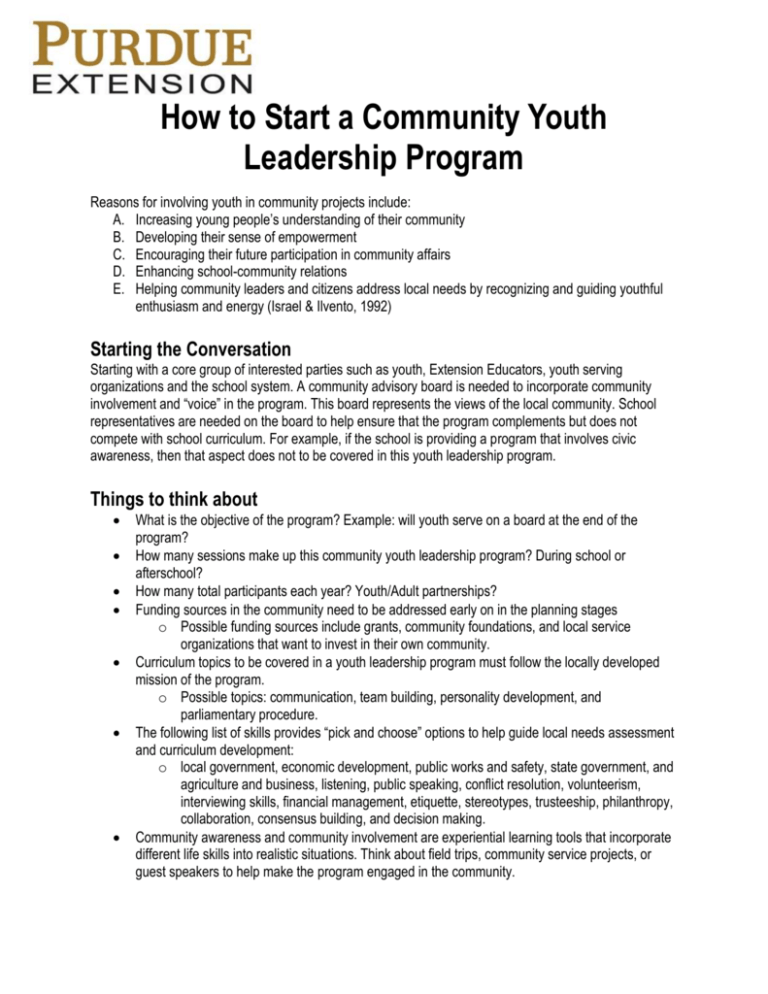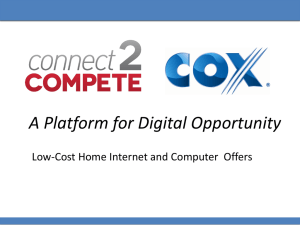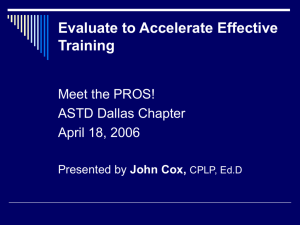How to Start a Community Youth Leadership Program
advertisement

How to Start a Community Youth Leadership Program Reasons for involving youth in community projects include: A. Increasing young people’s understanding of their community B. Developing their sense of empowerment C. Encouraging their future participation in community affairs D. Enhancing school-community relations E. Helping community leaders and citizens address local needs by recognizing and guiding youthful enthusiasm and energy (Israel & Ilvento, 1992) Starting the Conversation Starting with a core group of interested parties such as youth, Extension Educators, youth serving organizations and the school system. A community advisory board is needed to incorporate community involvement and “voice” in the program. This board represents the views of the local community. School representatives are needed on the board to help ensure that the program complements but does not compete with school curriculum. For example, if the school is providing a program that involves civic awareness, then that aspect does not to be covered in this youth leadership program. Things to think about What is the objective of the program? Example: will youth serve on a board at the end of the program? How many sessions make up this community youth leadership program? During school or afterschool? How many total participants each year? Youth/Adult partnerships? Funding sources in the community need to be addressed early on in the planning stages o Possible funding sources include grants, community foundations, and local service organizations that want to invest in their own community. Curriculum topics to be covered in a youth leadership program must follow the locally developed mission of the program. o Possible topics: communication, team building, personality development, and parliamentary procedure. The following list of skills provides “pick and choose” options to help guide local needs assessment and curriculum development: o local government, economic development, public works and safety, state government, and agriculture and business, listening, public speaking, conflict resolution, volunteerism, interviewing skills, financial management, etiquette, stereotypes, trusteeship, philanthropy, collaboration, consensus building, and decision making. Community awareness and community involvement are experiential learning tools that incorporate different life skills into realistic situations. Think about field trips, community service projects, or guest speakers to help make the program engaged in the community. Resources for more information on Community Youth Leadership Programs Here are a list of recommend resources to read before starting a program. These books, articles, and websites are a starting point to understand what research other organizations have used when describing youth leadership and community development. Van Linden, J.A., & Fertman C.I. (1998). Youth leadership a guide to understanding leadership development in adolescents. San Fransisco, CA.; Jossey-Bass Publishers. This book clearly states how to put together a leadership program that is applicable to youth and will help foster growth in developing leadership skills. It also provides many case examples, diagrams, and charts to help clarify suggestions and methods. Woyach, R.B. & Cox, K.J. (1997). Principles for youth leadership development programs. Leadership Link. (Spring, 1996). Columbus, OH: The Ohio State University Leadership Center. Woyach & Cox developed twelve principles that make effective leadership programs. The first five principles relate directly to the outcomes of a leadership program. The remaining seven principles speak to the process of leadership development. Community Partnership with Youth Inc. (www.cpyinc.org) is a national training and resource development organization dedicated to promoting active citizenship through youth and adult partnership. This website lists curriculum, training, and conferences provided by the organization. Some curriculum topics are Youth as Trustees, Youth in Governance, and Youth as Philanthropists. This organization believes in the effectiveness and importance of youth and adult partnership. Youth on Board (www.youthonboard.org) is a grassroots nonprofit organization, which prepares youth to be leaders in their communities. This organization seeks to strengthen relationships between youth and adults by providing publications, customized workshops, and technical assistance. The website lists publications, resources and contact information.











